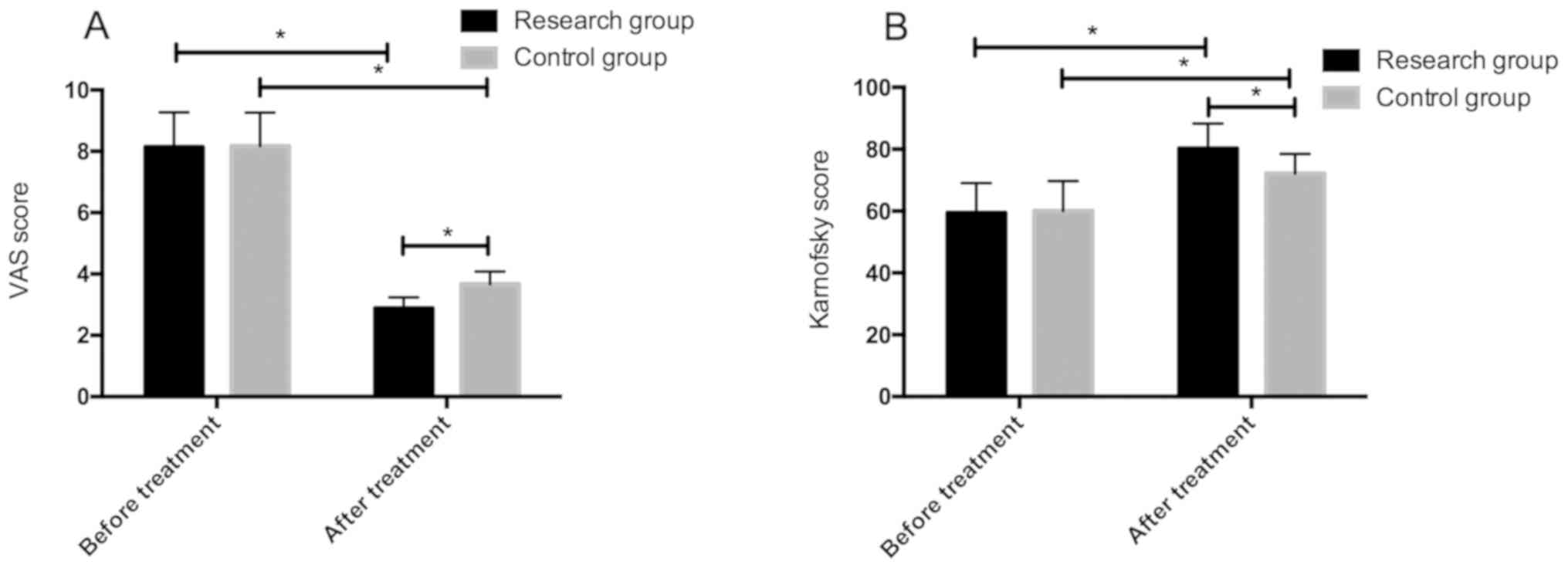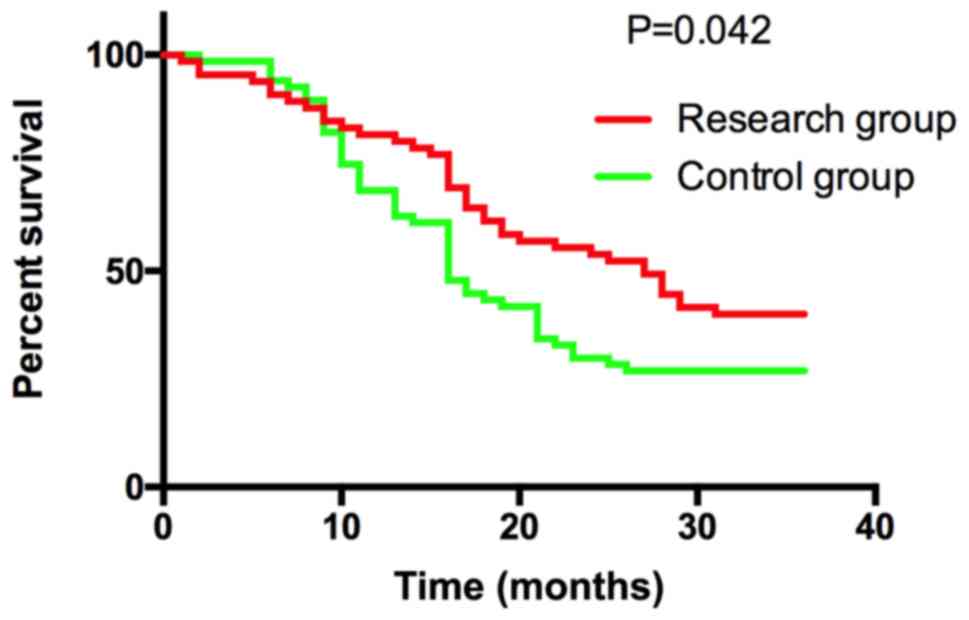|
1
|
Wang J, Fang Z, Lang N, Yuan H, Su MY and
Baldi P: A multi-resolution approach for spinal metastasis
detection using deep Siamese neural networks. Comput Biol Med.
84:137–146. 2017. View Article : Google Scholar : PubMed/NCBI
|
|
2
|
Roser S, Maharaj MM, Taylor MA, Kuru R,
Hansen MA and Ferch R: Vertebrectomy in metastatic spinal tumours:
A 10 year, single-centre review of outcomes and survival. J Clin
Neurosci. 68:218–223. 2019. View Article : Google Scholar : PubMed/NCBI
|
|
3
|
Gharzai LA, Beeler WH, Hayman JA, Mancini
B, Jagsi R, Pierce L, Moran JM, Dominello MM, Boike T, Griffith K,
et al Michigan Radiation Oncology Quality Consortium, :
Recommendations for single faction radiation therapy and
stereotactic body radiation therapy in palliative treatment of bone
metastases: A statewide practice patterns survey. Pract Radiat
Oncol. 9:e541–e548. 2019. View Article : Google Scholar : PubMed/NCBI
|
|
4
|
Pennington Z, Ahmed AK, Cottrill E,
Westbroek EM, Goodwin ML and Sciubba DM: Intra- and interobserver
reliability of the Spinal Instability Neoplastic Score system for
instability in spine metastases: A systematic review and
meta-analysis. Ann Transl Med. 7:2182019. View Article : Google Scholar : PubMed/NCBI
|
|
5
|
Schaub SK, Tseng YD, Chang EL, Sahgal A,
Saigal R, Hofstetter CP, Foote M, Ko AL, Yuh WTC, Mossa-Basha M, et
al: Strategies to mitigate toxicities from stereotactic body
radiation therapy for spine metastases. Neurosurgery. 85:729–740.
2019. View Article : Google Scholar : PubMed/NCBI
|
|
6
|
Zhang Y, Zhang MB, Luo YK, Li J, Zhang Y
and Tang J: Effect of chronic lymphocytic thyroiditis on the
efficacy and safety of ultrasound-guided radiofrequency ablation
for papillary thyroid microcarcinoma. Cancer Med. 8:5450–5458.
2019. View Article : Google Scholar : PubMed/NCBI
|
|
7
|
Leto G: Current status and future
directions in the treatment of bone metastases from breast cancer.
Clin Exp Pharmacol Physiol. 46:968–971. 2019. View Article : Google Scholar : PubMed/NCBI
|
|
8
|
van Amerongen MJ, van der Stok EP,
Fütterer JJ, Jenniskens SFM, Moelker A, Verhoef C, Grünhagen DJ and
de Wilt JHW: Results after simultaneous surgery and RFA liver
ablation for patients with colorectal carcinoma and synchronous
liver metastases. Eur J Surg Oncol. Jul 7–2019.(Epub ahead of
print). View Article : Google Scholar : PubMed/NCBI
|
|
9
|
Wallace AN, Tomasian A, Vaswani D,
Vyhmeister R, Chang RO and Jennings JW: Radiographic local control
of spinal metastases with percutaneous radiofrequency ablation and
vertebral augmentation. AJNR Am J Neuroradiol. 37:759–765. 2016.
View Article : Google Scholar : PubMed/NCBI
|
|
10
|
Cooke ME, Welch T, Gusakov O and Tornetta
P III: Are continuous femoral nerve catheters beneficial for pain
management after operative fixation of tibial plateau fractures? A
randomized controlled trial. J Orthop Trauma. 33:e447–e451. 2019.
View Article : Google Scholar : PubMed/NCBI
|
|
11
|
Barbetta C, Allgar V, Maddocks M, Ribeiro
C, Wilcock A, Currow DC, Phillips J and Johnson MJ:
Australia-modified Karnofsky Performance Scale and physical
activity in COPD and lung cancer: An exploratory pooled data
analysis. BMJ Support Palliat Care. Jul 11–2019.(Epub ahead of
print). View Article : Google Scholar : PubMed/NCBI
|
|
12
|
Capaul M, Zollinger H, Satz N, Dietz V,
Lehmann D and Schurch B: Analyses of 94 consecutive spinal cord
injury patients using ASIA definition and modified Frankel score
classification. Paraplegia. 32:583–587. 1994.PubMed/NCBI
|
|
13
|
Buergy D, Sharfo AW, Heijmen BJ, Voet PW,
Breedveld S, Wenz F, Lohr F and Stieler F: Fully automated
treatment planning of spinal metastases - A comparison to manual
planning of Volumetric Modulated Arc Therapy for conventionally
fractionated irradiation. Radiat Oncol. 12:332017. View Article : Google Scholar : PubMed/NCBI
|
|
14
|
Hamad A, Vachtsevanos L, Cattell A,
Ockendon M and Balain B: Minimally invasive spinal surgery for the
management of symptomatic spinal metastasis. Br J Neurosurg.
31:526–530. 2017. View Article : Google Scholar : PubMed/NCBI
|
|
15
|
Guzik G: Oncological and functional
results of the surgical treatment of vertebral metastases in
patients with multiple myeloma. BMC Surg. 17:922017. View Article : Google Scholar : PubMed/NCBI
|
|
16
|
Patchell RA, Tibbs PA, Regine WF, Payne R,
Saris S, Kryscio RJ, Mohiuddin M and Young B: Direct decompressive
surgical resection in the treatment of spinal cord compression
caused by metastatic cancer: A randomised trial. Lancet.
366:643–648. 2005. View Article : Google Scholar : PubMed/NCBI
|
|
17
|
de Ruiter GC, Nogarede CO, Wolfs JF and
Arts MP: Quality of life after different surgical procedures for
the treatment of spinal metastases: Results of a single-center
prospective case series. Neurosurg Focus. 42:E172017. View Article : Google Scholar : PubMed/NCBI
|
|
18
|
Kam NM, Maingard J, Kok HK, Ranatunga D,
Brooks D, Torreggiani WC, Munk PL, Lee MJ, Chandra RV and Asadi H:
Combined vertebral augmentation and radiofrequency ablation in the
management of spinal metastases: An update. Curr Treat Options
Oncol. 18:742017. View Article : Google Scholar : PubMed/NCBI
|
|
19
|
Griessenauer CJ, Salem M, Hendrix P,
Foreman PM, Ogilvy CS and Thomas AJ: Preoperative embolization of
spinal tumors: A systematic review and meta-analysis. World
Neurosurg. 87:362–371. 2016. View Article : Google Scholar : PubMed/NCBI
|
|
20
|
Stephenson MB, Glaenzer B and Malamis A:
Percutaneous minimally invasive techniques in the treatment of
spinal metastases. Curr Treat Options Oncol. 17:562016. View Article : Google Scholar : PubMed/NCBI
|
|
21
|
Toyota N, Naito A, Kakizawa H, Hieda M,
Hirai N, Tachikake T, Kimura T, Fukuda H and Ito K: Radiofrequency
ablation therapy combined with cementoplasty for painful bone
metastases: Initial experience. Cardiovasc Intervent Radiol.
28:578–583. 2005. View Article : Google Scholar : PubMed/NCBI
|
|
22
|
Wang GW, Han XX, Ma YL, Duo J, Yang JL and
Liao ZC: Radiofrequency ablation combined with subtotal corpectomy
for spinal metastases. Chin J Orthop. 31:938–943. 2011.(In
Chinese).
|
|
23
|
Hu H, Yang HL, Wang GL, Chen KW, Zhou QS
and Zhou M: The decision-making and survival prediction role of
Tomita score in the management spinal metastases. Chin J Spin Spin
Cord. 22:673–677. 2012.(In Chinese).
|
|
24
|
Hibberd CS and Quan GMY: Accuracy of
preoperative scoring systems for the prognostication and treatment
of patients with spinal metastases. Int Sch Res Notices.
2017:13206842017.PubMed/NCBI
|
|
25
|
Pointillart V, Vital JM, Salmi R, Diallo A
and Quan GM: Survival prognostic factors and clinical outcomes in
patients with spinal metastases. J Cancer Res Clin Oncol.
137:849–856. 2011. View Article : Google Scholar : PubMed/NCBI
|

















